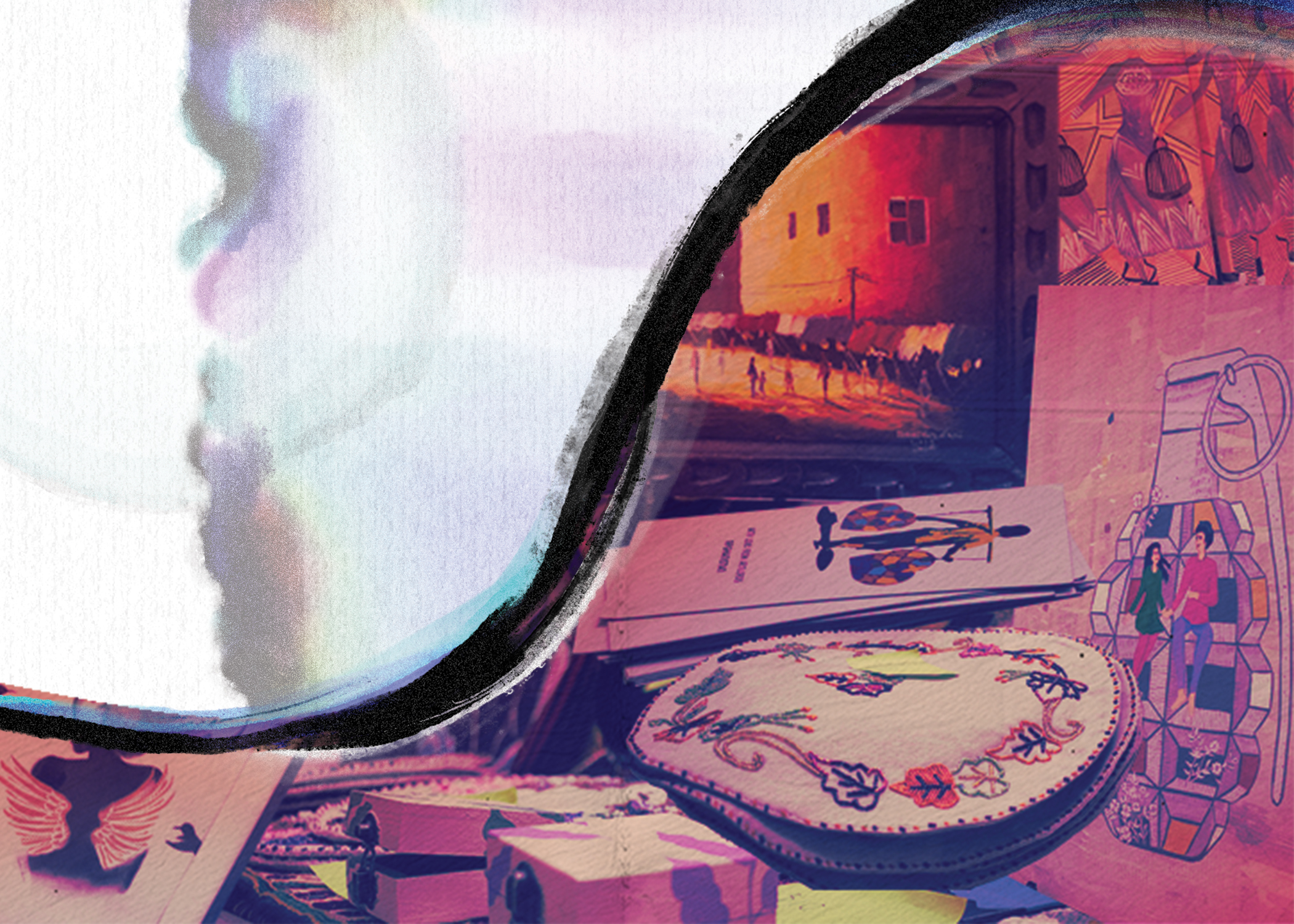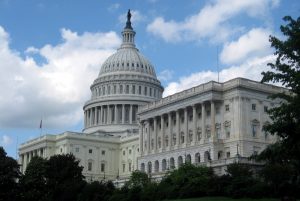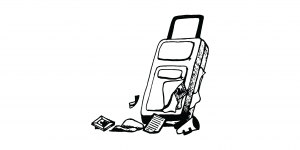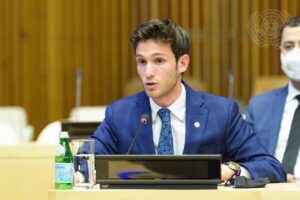Black easels lined the sides of the ICC galleria for No Lost Generation’s refugee art exhibit, each canvas depicting sorrow and resistance. One painting portrayed a row of dancing women holding bird cages in their hands. Another showed the black silhouette of a woman, golden wings on her back, as birds took flight around her.
No Lost Generation, a student-run refugee advocacy club, hosted the showcase on April 3 as part of its annual Refugee Week of Awareness. This year, it partnered with ArtLords, a street art organization founded in 2014 in Kabul, and Parla Arte, an initiative that supports refugees in D.C. by selling their artwork.
“When you really boil down to it and look at these amazing pieces people are creating and the emotions they convey, I think it just really shows the impact of everything going on,” Laura Logan (SFS ’27), president of No Lost Generation, said. “It’s just a great way to empower different refugee voices so they could tell their story.”
In addition to fundraising and putting on educational events like the arts showcase, No Lost Generation also hosts speaker events and does advocacy work.
The paintings displayed in the showcase were part of ArtLords’ “I Stand with You” campaign to recognize the Taliban’s treatment of women as gender apartheid. ArtLords has painted more than 2,200 murals in Afghanistan, using art as a form of activism.
“We wanted to work on different social issues, but we wanted to do it through unconventional ways,” Lima Halima-Khalil, co-founder of ArtLords, said.
The “I Stand with You” campaign also offers financial support to Afghan artists both inside and outside of the country. Some of the artists that ArtLords works with remain in hiding in Afghanistan, while others have been evacuated by the organization.
ArtLords has partnered with several universities to spread awareness about the conditions of women in Afghanistan. In March, the organization hosted a town hall and painted a mural at the College of William and Mary.
“We wanted to work with different schools and academic institutions, so that the faculty members, students, communities, get involved and get awareness about the situation of Afghan women, which is completely inhuman,” Halima-Khalil said.
Parla Arte, the other organization that partnered with No Lost Generation, was created in 2024 by Rania Najih, a senior at Walter Johnson High School in Bethesda. Najih was inspired in part by Love Without Borders, an organization based in Greece that provides art supplies to refugees and exhibits and sells their artwork. Najih started working with the Immigrant & Refugee Outreach Center (IROC) to create a similar initiative.
At the showcase, Parla Arte sold jewelry, placemats, bags, and other items handmade by refugees currently living in the D.C. area, with sales from the artwork going directly to the artists.
“Initially, I focused on painting, but I quickly discovered that the refugees possessed incredible talents in various areas, including sewing, embroidery, and a wide range of crafts,” Najih wrote in a statement to the Voice.
Najih also sells her own necklaces, which she first started creating during the pandemic. Her earnings are donated to the IROC. Najih emphasized the critical role art can play in providing an outlet for healing.
“Through the medium of art, refugees can convey their personal and unique experiences. Art is important because not everyone has access to therapy. For many people, art heals inner wounds,” Najih wrote.
The Taliban takeover in 2021 had profound impacts on the arts community in Afghanistan, with restrictions on music, sculpture, and portrait drawing. Many of ArtLords’ murals have been painted over as part of widespread censorship. Education has also been impacted—the Taliban banned women’s education and prohibited men from studying painting.
Refugees who fled the country and those still seeking to leave now face new obstacles from the Trump administration. President Donald Trump suspended the U.S. Refugee Admissions Program on Jan. 20, pausing the entry of refugees and cutting funding for recent arrivals. These restrictions have turned creative expression into a daunting concept.
“Many of the refugees I worked with are now afraid to participate, fearing that their artwork on display may draw attention to their identities. It’s disheartening that they escaped one form of fear only to find themselves living in fear again,” Najih wrote.
ArtLords has also been impacted by the recent federal funding cuts. The organization used to receive funding from the National Endowment for Democracy to buy art supplies, transport art to the U.S., and evacuate artists. Those grants have been eliminated.
Despite these obstacles, Halima-Khalil underscored the resilience of art as a path forward.
“I think art is a tool or a medium that cannot be stopped. Of course, we are scared that our work, which is mostly political, and it just does critical work, would be picked up. But at the same time, that is the purpose—to give voice to the voiceless,” Halima-Khalil said.
No Lost Generation has responded to recent political developments by increasing fundraising efforts and continuing congressional letter writing and lobbying. During its Refugee Week of Awareness, the club hosted a book talk, gala, and several speaker events. Keeping the club active helps Logan stay hopeful.
“Even though this work sometimes feels a little hopeless, because of everything that’s happening, I think just slowly fundraising, advocating, getting the message across, and showing that students, Georgetown as an organization, isn’t going to stand with these violations of human rights… I think it’s powerful,” Logan said.






